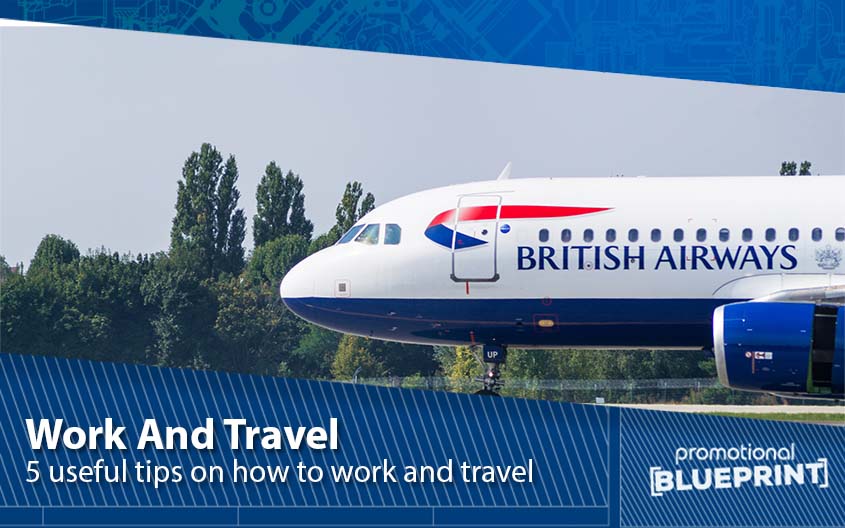
The concept of work and travel isn’t exactly new. It is especially popular with millennials and zoomers who like to explore the planet and earn their way through each trip.
Sadly, with the current economic situation still somewhat shaky and the wages dwindling due to the recent pandemic, you don’t get too many opportunities to travel. But it will only be a matter of time before you can travel the world again, without limits. All you really need is a functioning laptop, a place with solid wi-fi, a credit card (or PayPal account), and some willpower.
Of course, going off into the world and working through each trip can be a bit daunting. Even seasoned veterans aren’t immune to that. In this article, we will present you with a list of useful tips on working while travelling.
Tips on How to Work While Traveling
Scheduling Is Crucial
Sometimes it’s impossible to avoid a hectic schedule during one’s travels—flight times, hotel check-in and check-out hours, business hours for cafes and restaurants with wi-fi hotspots, etc. All of these can negatively affect your work time. Furthermore, you might want to actually visit some sites and spend time having fun while in a new area.
In order to circumvent these things, a loose working schedule sounds like the right solution. But in reality, you have to do a bit of planning up-front.
Obviously, you won’t be able to cover every instance of a sudden schedule change. But keeping a moderate timetable of ‘work hours’ will still give you a sense of routine. More importantly, it will help you plan your free time with extra efficiency.
Always Have a Workspace in Mind
One of the key aspects of working and travelling is having an office anywhere, anytime. For instance, you can take your laptop anywhere. Maybe you can go to a coffee shop, a brewery, a park, an art gallery, the lake, or the beach. As long as the battery is charged and you find yourself a little quiet corner to work in, you’re golden.
However, there’s a reason why most people still prefer not to work from their homes. An office is a space where you work, where all of your work-related frustrations need to stay. Your bedroom is where you rest, your kitchen where you eat, and so on. In other words, if you attempt to work in these spots, something will distract you, and you won’t be able to focus; plus, you’ll be taking all of the work-related frustration with you.
That’s why, when you travel, you should always find a spot to work in. Also, make sure that it’s different from the spot where you rest or party. It will give your brain a chance to categorise, focus, and, when necessary, relax and enjoy the silence.
Of course, there’s also a practical component to finding a particular work spot. Working from the car, the bus, or the plane is just not practical due to all of the distractions around you. But working in a bar with earbuds on will be beneficial since it’s a much more intimate atmosphere that enables you to think and improves your productivity.
Dress for Success
There are some types of jobs you can do while travelling that involve a part-time boss. You can work at a craft in a local village, help out the farmers, or join a local artist in a live street performance. During those times, you will need the proper gear to finish the job, be it a fancy suit or a pair of worker’s overalls.
Obviously, if you’re doing online work, you will rarely need to wear fancy clothes. There are exceptions, of course. For instance, some online teaching courses do require you to wear proper business attire. If you happen to do one of these jobs, make sure to pack one or two such ‘uniforms’ when you travel abroad.
Now, is it crucial for you to wear work clothes if, for example, you’re a freelance writer, a programmer, or a graphic designer who doesn’t even get to see their client face-to-face? Believe it or not, the answer is a resounding Yes.
Once again, it comes down to psychology. By wearing a specific set of work clothes, you let your mind know that it has to work now, that it isn’t relaxing, so you can properly do any task at hand. Equally important, you will have to take off those ‘work clothes’ once you’re done and put on something more casual. That way, your tired mind now knows it deserves to rest and that the hard part of the day is done with.
Communication Still Matters
As with the dress code, the amount of communication you’ll be doing while you work and travel will vary depending on your job.
Let’s say that a typical firm still employs you. However, the higher-ups state that you have to work remotely. So, the first thing you’ll need to do is to notify your coworkers that you’ll be travelling while you work. More importantly, always keep active communication with them; that way, you won’t be out of touch, and you’ll manage to maintain some workplace connectivity.
Naturally, some types of work don’t require a lot of communication. One such instance is working for a remote client entirely via email. Even in those circumstances, make sure to communicate as much as possible with your client. Not only will it show them how diligent you are, but you’ll also maintain good relations and, potentially, land a new job opportunity.
Pack in Moderation
Packing is always a bit of a gamble, especially if you’re visiting a different country altogether. Figuring out what to wear is never easy, and your entire wardrobe can end up being useless just because of the different climate.
However, that’s just travelling in and of itself. What about work and travel?
Well, in these instances, you have to compartmentalise. In other words, you’ll need to figure out what some of your most frequently used items are and pack only the essentials that you’re sure to use. That goes for both work-related objects and everyday things.
Let’s focus on the work-related list first. Think about what you tend to use most often while at your work desk. Is it a custom pen, a branded notebook, a stack of personalised paper or printed sticky notes, a box of logo stationery? Do you use your laptop or your tablet a lot, and if so, do you need USB flash drives or earbuds?
Additionally, when packing your clothes and toiletries, only bring the items you know are necessary. You can always buy soap or toothpaste, but an entirely new toothbrush or a towel in every other town is not exactly the most economical option. In terms of clothing, bring things that you wear most often and things that can withstand a lot of cycles in the washing machine.
Work & Travel in 2022 Summarised
As scary as it may seem, work and travel is an excellent option for both newbies and veteran workers. It allows you to expand your horizons, experience new things in life and meet new people from across the globe. And if you do it right, you’ll learn a whole new set of skills and get yourself ready for new challenges that life has in store.
You may also like:
Return to Office: 10 Tips to Ensure the Safety of Employees
If you require further information or have any specific questions, don’t hesitate to give a member of our experienced team a call on 0800 0148 970 or simply email us today.






